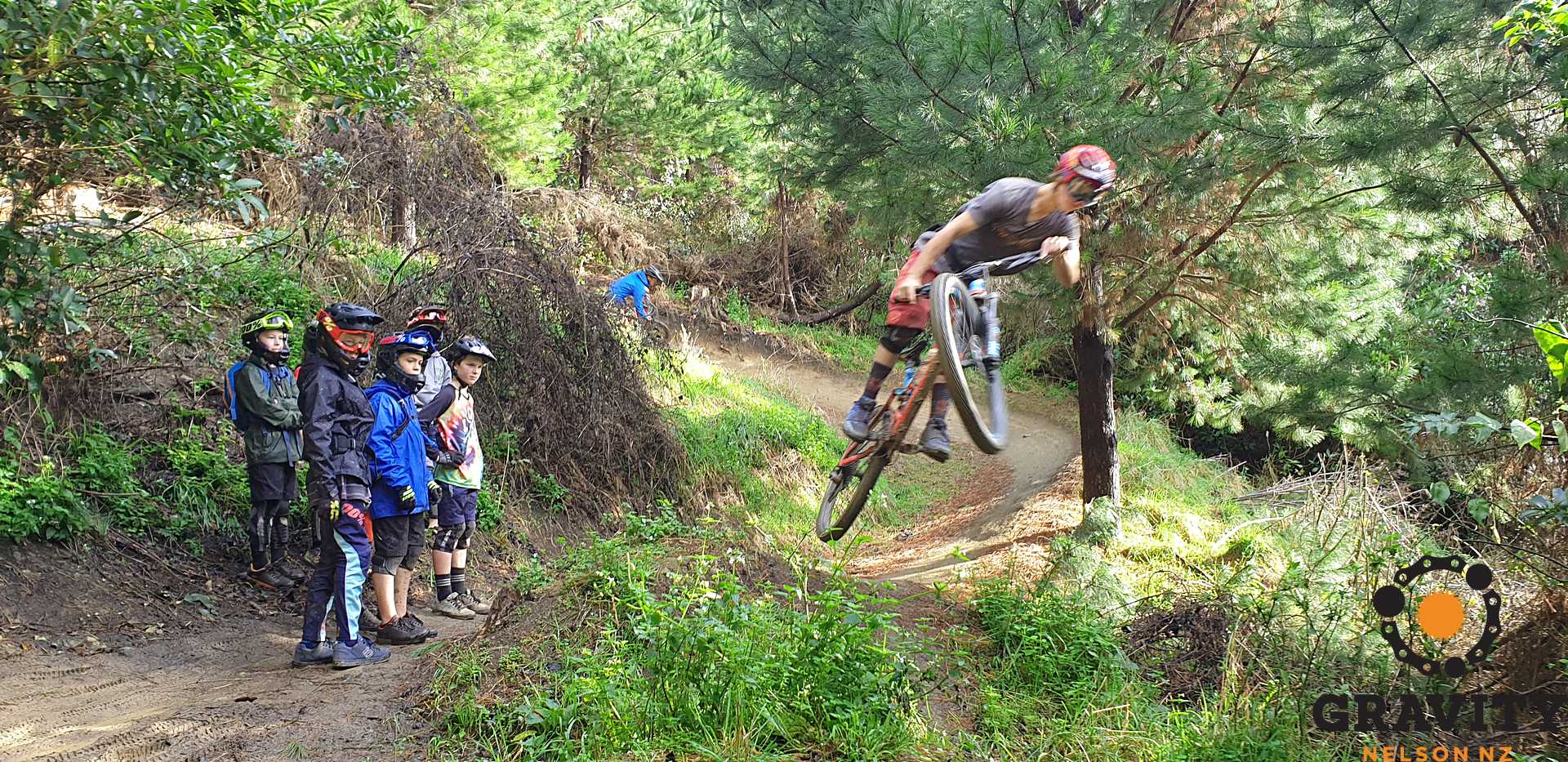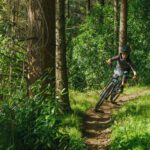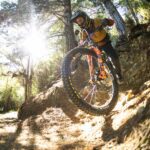
The Comprehensive Role of a Mountain Bike Coach: Taking Young Riders to the Next Level
Introduction
Mountain biking is an exhilarating and challenging sport that demands more than simply riding harder trails to progress as a racer. While riding difficult trails provides advantages, it alone cannot guarantee success. The role of a mountain bike coach is crucial in the development of young riders, emphasizing that a coaching program offers much more than simply ripping down harder trails. This article will highlight the importance of a mountain bike coach in advancing a young rider’s skills and performance, drawing an analogy to football. It will emphasize that, just like in football, kids cannot excel by solely playing games against tough opponents. The other piece of the puzzle lies in drills and coaching sessions conducted in controlled environments, where specific skills can be built and later applied to racing scenarios. By understanding the significance of coaching, young riders can progress beyond trail proficiency and achieve their full potential in mountain bike racing.
Advantages of Coaching Beyond Trail Riding
1. Skill Development and Progression
A mountain bike coach provides young riders with a platform to learn and practice specific skills in controlled environments. Through drills and exercises, coaches focus on developing fundamental skills such as body positioning, balance, cornering, technical descents, efficient climbing, jumping, pumping, race nutrition, and bike setup. According to Gravity Nelson, a mountain bike coaching center, formal coaching programs help in every sport, and it is hard to imagine participating in any sport without regular lessons [1](https://gravitynelson.co.nz/mtb-coaching/top-ten-reasons-mtb-coaching/). Coaching programs and structured training sessions allow young racers to build a strong foundation, progress at their own pace, and master skills that can be effectively applied during trail riding and racing.
2. Safety and Injury Prevention
Coaching in controlled environments significantly reduces the risk of injuries that can occur when young riders push their limits solely on challenging trails. Coaches teach riders how to ride safely, assess trail features, and make better decisions. They ensure young riders understand their limits, leading to a safer and more enjoyable riding experience. A skilled coach’s guidance helps minimize the possibility of injury and allows riders to push their boundaries in a controlled manner. USA Cycling emphasizes the importance of letting kids enjoy the freedom and joy of riding a bike and recommends stepping back to avoid forcing them into intense training and potential burnout [2](https://usacycling.org/article/building-the-best-riders-how-to-develop-young-mountain-bikers).
3. Comprehensive Skill Set
A mountain bike coach offers young racers a comprehensive set of skills that extend beyond trail proficiency. Coaching encompasses race strategy, mental resilience, cornering excellence, efficient climbing, technical descents, jumping and pumping techniques, race nutrition, and bike setup. This well-rounded skill set enhances overall performance, race results, and long-term growth in racing abilities. By providing individualized guidance and coaching sessions, coaches tailor their approach to each rider’s strengths, weaknesses, and areas for improvement. This personalized feedback and ongoing evaluation allow coaches to track the development of riders, identify areas that require further attention, and provide specific guidance to optimize performance.
4. Individualized Guidance and Progress Monitoring
Coaches play a vital role in providing individualized guidance and monitoring the progress of young riders. They assess each rider’s strengths, weaknesses, and areas for improvement, tailoring coaching sessions accordingly. Through personalized feedback and ongoing evaluation, coaches track the development of riders, identify areas that require further attention, and provide specific guidance to optimize performance. This individualized approach helps young riders build confidence, set goals, and overcome challenges. Gravity Nelson emphasizes that coaching clinics and regular coaching lessons can lead to breakthroughs in skills and technique, often accompanied by the realization that lessons could have been taken earlier [1](https://gravitynelson.co.nz/mtb-coaching/top-ten-reasons-mtb-coaching/).
5. Competitive Advantage
Regularly riding challenging trails can give young riders a significant advantage over their peers who do not have access to Grade 5 and 6 trails. Exposure to difficult terrains helps build confidence, hone skills, and improve technical abilities. However, riding alone is insufficient. A mountain bike coach bridges the gap by providing guidance, expertise, and structured training programs that complement trail riding. This comprehensive approach ensures young riders are well-prepared to excel in racing situations and reach their full potential. Similar to other high-performance sports such as skiing or football, coaching young athletes is vital in developing their skills, technique, and race strategy [3](https://www.britishcycling.org.uk/coaching/article/coa20090626-Coaching-Young-Riders-CPD-Article-July).
Conclusion
While riding harder trails provides a competitive edge, it is essential to recognize the importance of a mountain bike coach in the progression of young riders. Coaching drills and structured programs offer young racers a comprehensive skill set that extends beyond trail proficiency. A skilled coach provides individualized guidance, monitors progress, and prepares riders for the challenges they will face in racing scenarios. By embracing coaching as an integral part of a young rider’s journey, they can elevate their mountain biking skills, enhance safety, achieve better race results, and unlock their full potential in the exciting world of mountain bike racing.
References
- Gravity Nelson NZ. Top Ten signs you need to do a mountain bike coaching clinic… or in fact more than one!
- USA Cycling. Building the Best Riders: How to Develop Young Mountain Bikers
- British Cycling. Coaching Young Riders
“`
Author Bio:
Alistair Matthew, a New Zealand native, has a rich background in mountain biking, coaching, guiding, and entrepreneurship, particularly in adventure tourism. His journey began in Bolivia, where he moved in 1998 and discovered a thrilling ride down the Yungas Road, known as the “World’s Most Dangerous Road”[^1][^2][^3]. Alistair established Gravity Assisted Mountain Biking to offer guided tours down this perilous route, marking the inception of a new adventure tourism industry in Bolivia[^3]. His entrepreneurship didn’t stop there; he also founded other adventure tourism businesses such as Zzip the Flying Fox, Urban Rush, and the Adventure Brew Hostel in Bolivia.
In 2016, after 18 years in Bolivia, Alistair returned to New Zealand, seeking new cycling opportunities[^4]. He settled in Nelson, where he became a business partner in Gravity Nelson, an adventure tourism business focusing on mountain biking[^5]. Alistair is also a seasoned mountain biking coach and guide with over 27 years of experience in the field[^6]. He holds several mountain biking qualifications including PMBIA Level 1, NZOIA Level 2 Senior Instructor, and Skills Active Mountain Bike strand of the Outdoor Leadership Certificate at various levels. His coaching specializations range from cornering and drops clinics to mountain biking myth correction and kinematics video analysis of body position and technique among others[^6].
Alistair’s entrepreneurial spirit, coupled with his passion for mountain biking and adventure tourism, have significantly contributed to the adventure tourism industry in both Bolivia and New Zealand. Through his ventures, he has not only pioneered new thrilling experiences for adventure seekers but also helped in developing mountain biking trails and facilities to bolster the tourism sector in Nelson, New Zealand[^5][^7].
—
References
[^1]: Poddtoppen.se. (n.d.). #50 Alistair Matthew – Pioneering Adventure Tourism in South America. Retrieved from [Poddtoppen.se](https://www.poddtoppen.se)[^2]: Explore.com. (n.d.). Only Extreme Adventurers Should Try Biking Bolivia’s ‘Death Road’. Retrieved from [Explore.com](https://www.explore.com)
[^3]: Hunt, S. (n.d.). No refunds on the Road of Death. National Library of New Zealand. Retrieved from [National Library of New Zealand](https://natlib.govt.nz)
[^4]: Hunt, S. (n.d.). No refunds on the Road of Death. National Library of New Zealand. Retrieved from [National Library of New Zealand](https://natlib.govt.nz)
[^5]: Stuff.co.nz. (n.d.). Adventure tourism pioneer eyes Nelson’s potential. Retrieved from [Stuff.co.nz](https://www.stuff.co.nz)
[^6]: Gravity Nelson NZ. (n.d.). Gravity’s Coaches – Gravity Nelson NZ. Retrieved from [Gravity Nelson NZ](https://www.gravitynelson.co.nz)
[^7]: Stuff.co.nz. (n.d.). From Bolivia to Nelson: Kiwi mountain biker who conquered the Bolivian death road. Retrieved from [Stuff.co.nz](https://www.stuff.co.nz)


